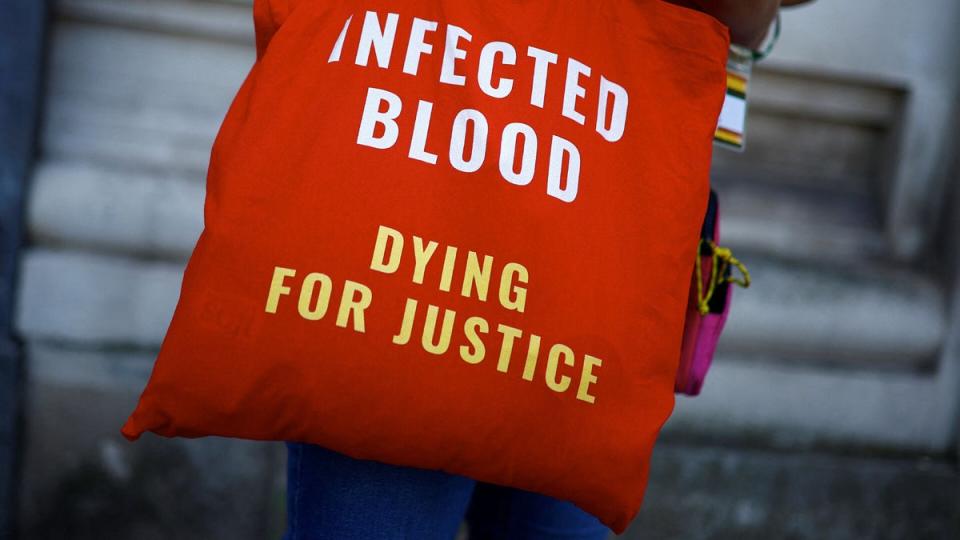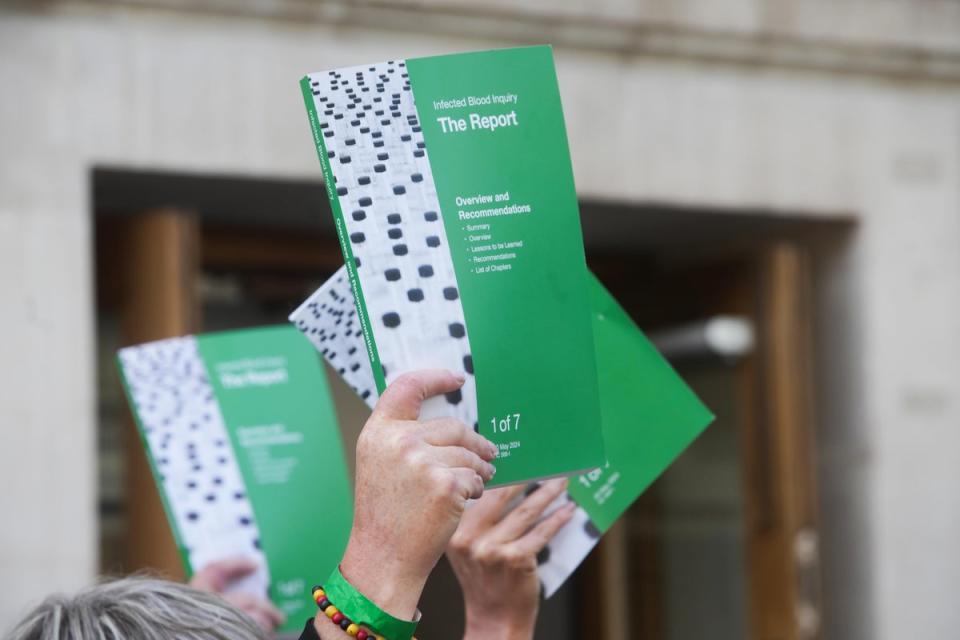First infected blood scandal victims to receive payments by end of 2024
- Oops!Something went wrong.Please try again later.
The first victims of the infected blood scandal will receive their final compensation payment before the end of the year, the government has said.
Announcing the details of the Infected Blood Compensation Authority, cabinet office minister John Glen also promised that all those affected by the scandal will be eligible to claim compensation under the scheme.
And, to cheers from campaigners watching in the Commons’ public gallery, Mr Glen announced Sir Robert Francis as the interim chairman of the body that will administer the compensation scheme.

Sir Robert led the investigation into one of the NHS’s worst care disasters, the Mid Staffordshire hospital scandal.
After his appointment, Sir Robert said: “Having witnessed the depth of victims’ suffering as I compiled my report on the compensation framework, I know the urgency of providing them with the remedies they are entitled to as soon as is practicable.
“The government’s proposals for the scheme are positive and meaningful and I look forward to discussing them with the community through a validation exercise which the minister and I have agreed will take place.”
Mr Glen added: “We are establishing the Infected Blood Compensation Authority, an arm’s-length body to administer the compensation scheme.
“A shadow body has already been set up and an interim CEO has been appointed, and today I’m delighted to announce the appointment of Sir Robert Francis as the interim chair of the organisation.
“The experience and the care that Sir Robert will bring to this role will ensure that the scheme is credible and trusted by the community. His support in delivering this scheme will be invaluable.”
Mr Glen told MPs it was the government’s expectation that the first payments would be made before the end of the year, stressing that “time is of the essence”. But the minister would not say how much the total compensation bill will be, with the government yet to finalise the details.
It came after the final report of the Infected Blood Inquiry pointed the finger at politicians, doctors and civil servants for a chilling cover-up of a scandal that led to deaths and suffering that continue to this day.
From the 1970s to the 1990s, a calamity of failures left 30,000 patients infected with HIV and hepatitis and has killed more than 3,000 people to date.
Sir Brian Langstaff’s report identified dozens of failures by the government and NHS, including:
Allowing the importation and distribution from 1973 of blood products made in the US and Austria which carried a high risk of causing hepatitis
Teenage boys being treated “as objects for research” and infected with HIV and hepatitis C through contaminated products
Deliberate destruction of documents and falsely reassuring the public and patients that blood didn’t carry Aids and that hepatitis C was relatively mild and inconsequential
Failing to tell people they were infected or delaying telling them, and failing to trace patients once universal hepatitis C screening was introduced
Repeatedly using inaccurate and defensive language which “cruelly” told people that they had received the best treatment available
Mr Glen said further interim payments will be made as he recognised that members of the infected blood community are dying every week.
He told MPs: “There may be people, indeed there will be people, listening today who are thinking to themselves that they may not live to receive compensation.
“Today, I’m announcing the government will be making further interim payments ahead of the establishment of the full scheme.
“Payments of £210,000 will be made to living infected beneficiaries, those registered with existing infected blood support schemes, as well as those who register with the support scheme before the final scheme becomes operational, and the estates of those who pass away between now and payments being made.”

In August 2022, around 3,000 surviving victims were awarded interim payments of £100,000 each at the recommendation of Sir Brian. He called for them to be made “without delay” given the high mortality rate of those infected with HIV and hepatitis C.
Mr Glen reiterated the prime minister’s apology to victims of the infected blood scandal, telling the Commons: “Yesterday the prime minister spoke about the anguish that the infected blood scandal brought to those impacted by it. I want to reiterate his words and apologise again today, I am sorry.”
He later added: “Those who have been infected or affected as a result of this scandal will receive compensation.
“To be crystal clear, if you have been directly or indirectly infected by NHS blood, blood products or tissue contaminated with HIV or hepatitis C, or have developed a chronic infection from blood contaminated with hepatitis B, you will be eligible to claim compensation under the scheme.
“And where an infected person has died, but would have been eligible under these criteria, compensation will be paid to their estate. And this will include where a person was infected with hepatitis B and died during the acute period of infection.”
The Hepatitis C Trust welcomed the announcement, highlighting Sir Robert’s appointment in particular.
Chief executive Rachel Halford said it is “reassuring to the infected blood community that someone who understands the scandal and the people affected by it will guide this important work”.
She added: “Interim payments of a further £210,000 will provide reassurance to many facing financial hardship because of years of ill-health, job loss or caring responsibilities linked to this scandal.”
But she said much more detail is urgently needed to clarify who will be able to access financial support and when, alongside clearer information on the future of existing blood support schemes.

